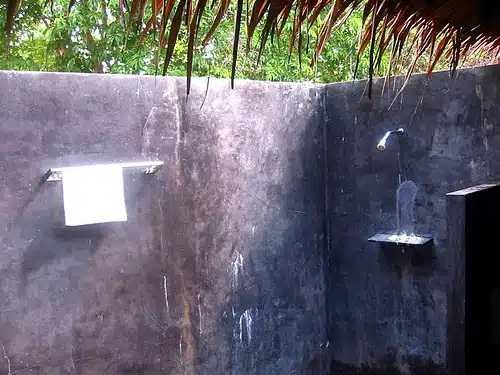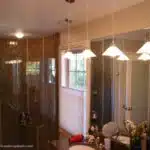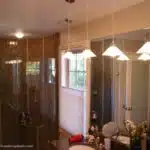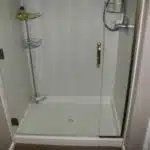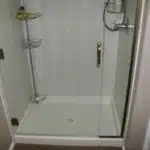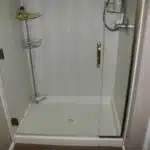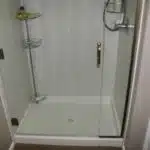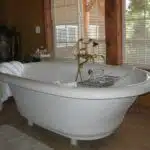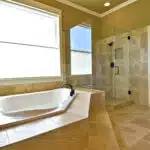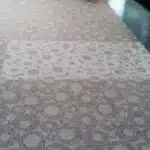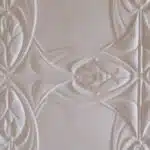The selection of materials for shower walls is an essential aspect of any home improvement project. A well-designed shower not only adds value to a home, but also offers a relaxing and rejuvenating experience for its users. With so many options available in the market, it can be challenging to choose the perfect material that offers durability, functionality, and style. In this article, we have compiled a list of the 10 best materials for shower walls that will help you make an informed decision for your next bathroom renovation.
From classic tiles to modern glass panels, there are various materials that offer different benefits for shower walls. The right material can transform your drab bathroom into a luxurious spa-like retreat. Whether you prioritize low-maintenance or high-end aesthetics, our comprehensive list includes materials suitable for every budget and preference. So let’s dive in and explore the top 10 materials that will help you create the perfect shower space for your needs.
Classic Ceramic Tiles
When it comes to shower walls, ceramic tiles are a classic choice that has been popular for decades. These tiles come in a wide variety of colors, shapes, and sizes that can suit any bathroom decor. Plus, they are durable and easy to clean, making them a practical option for busy households.
One of the most significant benefits of ceramic tiles is the range of tile patterns available. From subway tiles to intricate mosaics, there is no shortage of options when it comes to creating a unique design for your shower walls. Additionally, these tiles can be arranged in various ways to create different effects such as herringbone or diamond patterns.
Another crucial factor to consider when choosing ceramic tiles for your shower walls is the grout options available. Grout is used to fill the gaps between tiles and plays an essential role in keeping them secure and waterproof. There are many types of grout available with varying degrees of water-resistance, durability, and mold resistance. For example, epoxy grout is one option that is highly resistant to moisture and mildew but can be more challenging to work with than traditional cement-based grouts.
Moving on from ceramic tiles, natural stone tiles are another popular choice for shower walls due to their luxurious look and feel.
Natural Stone Tiles
Classic ceramic tiles are a popular choice for shower walls due to their durability and resistance to water. However, natural stone tiles can also be a great option for those looking for a unique and elegant touch to their bathroom. Natural stone tiles come in a variety of colors and patterns, ranging from marble to slate.
One of the pros of using natural stone tiles for shower walls is their aesthetic appeal. The unique patterns and colors found in natural stone can add a touch of luxury to any bathroom. Additionally, natural stone tiles are durable and can last for years with proper maintenance.
On the other hand, there are some cons to using natural stone tiles for shower walls. Natural stone is more porous than ceramic tile, which means it can absorb water and stains more easily. This makes it important to properly seal the tiles before installation and reseal them regularly afterwards. Additionally, some types of natural stone can be more expensive than ceramic tile.
Maintenance tips for natural stone shower walls include regular cleaning with a gentle cleaner specifically designed for use on natural stone surfaces. Avoid using harsh chemicals or abrasives that could damage the surface of the tile. Additionally, it’s important to reseal the tile every few years to help prevent water damage or staining.
Transitioning into discussing porcelain tiles: Porcelain tiles are another popular option for shower walls due to their durability and resistance to water. Let’s take a closer look at the pros and cons of this material next.
Porcelain Tiles
- Porcelain tiles are one of the most popular materials used for shower walls, due to their durability, versatility and ease of maintenance.
- Porcelain tiles come in a variety of colors, sizes and finishes, making it easy to customize the look of your shower walls.
- Porcelain tiles are highly resistant to water damage and staining, making them an ideal choice for wet environments.
- Porcelain tiles can be installed easily with a few simple tools, making them a great choice for DIY projects.
- Glazed porcelain tiles are impervious to water and are often used in high-moisture areas such as showers and bathrooms.
- Unglazed porcelain tiles are available in a variety of colors and textures, and are often used in more decorative applications.
Advantages Of Porcelain Tiles
When it comes to shower walls, choosing the right materials can be a daunting task. Porcelain tiles are an excellent choice for those who want durability without breaking the bank. The advantages of porcelain tiles over other materials are numerous and worth considering.
One of the most significant advantages of porcelain tiles is their durability versus cost. They are incredibly resilient and resistant to damage from heat, moisture, and stains. Compared to other materials such as natural stone, porcelain tiles require less maintenance and have a longer lifespan. Additionally, they come in a wide range of colors and designs that can complement any bathroom décor.
Another advantage of porcelain tiles is their low maintenance requirements. They are easy to clean with just soap and water or a mild cleaning solution. Unlike natural stone, they do not require sealing, which can save homeowners time and money in the long run. With proper care, porcelain tiles can retain their appearance for many years, making them an ideal choice for busy households.
In conclusion, porcelain tiles offer a durable and cost-effective option for shower walls that require minimal maintenance. Their ability to withstand wear and tear makes them an attractive choice for homeowners who want long-lasting results without sacrificing style or functionality. Whether you’re renovating your bathroom or building your dream home from scratch, consider investing in porcelain tiles for your shower walls – you won’t regret it!
Types Of Porcelain Tiles
When it comes to selecting the right porcelain tiles for your shower walls, it’s essential to understand the different types available. Each type has its own advantages, disadvantages, and design options. Let’s take a closer look at some of the most common types of porcelain tiles.
One type of porcelain tile is glazed porcelain. It’s a popular choice due to its durability and low maintenance requirements. Glazed porcelain tiles are coated with a layer of liquid glass that gives them a glossy finish that is resistant to scratches and stains. However, they can be slippery when wet, which can be a concern for homeowners with children or elderly individuals.
Another type of porcelain tile is unglazed porcelain. These tiles are made from natural clay that is fired at high temperatures, giving them a more earthy appearance than glazed tiles. They are slip-resistant and have better traction when wet compared to glazed tiles. However, because they are not coated with liquid glass, they require sealing to prevent staining.
Lastly, full-body porcelain tiles are made from clay that has been dyed all the way through rather than just on the surface like glazed tiles. This makes them extremely durable and resistant to wear and tear. They also come in a wide range of colors and patterns that can mimic natural stone or wood. However, they tend to be more expensive than other types of porcelain tiles.
In summary, understanding the pros & cons and design options of different types of porcelain tiles can help you choose the best option for your shower walls based on your needs and preferences. Whether you opt for glazed, unglazed or full-body porcelain tiles, each type has its unique qualities that make them an excellent choice for your bathroom renovation project.
Installation Of Porcelain Tiles
Porcelain tiles are an excellent choice for bathroom renovations due to their durability and low maintenance requirements. However, proper installation is crucial to ensure that they look and function as intended. The first step in the installation process is to prepare the surface by removing any old tiles or adhesive residue. This can be done using a chisel or scraper, but it’s important not to damage the underlying wall or floor.
Once the surface is prepared, the next step is to lay out the tiles in a pattern that suits your design preferences. This involves measuring and marking the area where the tiles will be installed, determining the tile layout, and cutting individual tiles as needed using a tile cutter. It’s essential to take your time during this step since mistakes can result in uneven grout lines or unsightly gaps between tiles.
After laying out the tiles, it’s time to apply thin-set mortar to secure them in place. This involves spreading a layer of mortar onto the surface using a trowel and then pressing each tile into place. Once all of the tiles are installed, it’s important to let them cure for at least 24 hours before applying grout.
Grout cleaning is an essential part of maintaining porcelain tile installations since grout can easily become discolored over time due to moisture and dirt buildup. Regular cleaning with a mild detergent solution and a scrub brush can help keep grout looking its best. Overall, proper installation and maintenance of porcelain tiles can help ensure that your bathroom renovation project looks great for years to come.
Glass Panels
Glass Panels for Shower Walls: Pros and Cons
Glass panels are a popular choice for homeowners looking to create an elegant and modern look in their bathrooms. One of the biggest advantages of glass panels is their ability to reflect light, making the space appear brighter and larger. Additionally, they are easy to clean and maintain, requiring only a simple wipe down with a soft cloth.
However, there are some cons to using glass panels for shower walls. One major concern is safety, as glass can shatter if it is hit hard enough or subjected to extreme temperatures. It is important to choose tempered glass that has been treated with heat or chemicals to increase its strength and durability. Another consideration is privacy, as clear glass panels offer little protection from prying eyes.
Installation requirements for glass panels vary depending on the size and thickness of the panels, as well as the type of hardware used to secure them in place. It is important to work with an experienced contractor who can properly measure and cut the glass to ensure a perfect fit. Glass panels require regular maintenance to prevent water stains and soap scum buildup.
Acrylic Panels for Shower Walls: Installation Tips
Acrylic panels are a great alternative to glass for homeowners who want the look of glass without the safety concerns or high cost. They are lightweight, durable, and come in a variety of colors and patterns to match any bathroom décor. Acrylic panels also offer better insulation than glass, helping keep your bathroom warmer in colder months.
When installing acrylic panels, it is important to follow manufacturer instructions carefully. Most acrylic panels come with pre-drilled holes for easy installation, but you will need special hardware designed specifically for use with acrylic material. It is also important to make sure that your shower walls are level before beginning installation.
In conclusion, both glass and acrylic panels have their pros and cons when it comes to shower wall materials. While glass offers an elegant look and easy maintenance, safety concerns and privacy issues may be a deterrent for some homeowners. Acrylic panels, on the other hand, offer a cost-effective and practical solution that is easy to install and maintain. The next step is to explore the benefits and drawbacks of using acrylic panels for shower walls.
Acrylic Panels
Just like how glass panels offer a sleek and modern look to shower walls, acrylic panels are a versatile option that can provide both style and functionality. These panels are made from durable thermoplastic materials that can withstand wear and tear, making them an excellent choice for high-traffic areas like the bathroom. Acrylic panels come in various colors, patterns, and textures, allowing homeowners to find the perfect match for their bathroom design.
Advantages of using acrylic panels include their resistance to scratches, stains, and mold. They are lightweight and easy to install, which makes them an ideal DIY project for homeowners looking to upgrade their shower walls without professional help. The cost of acrylic panels is also lower than other materials like natural stone or tile, making it an affordable option for those on a budget.
However, there are some disadvantages to consider before choosing acrylic panels as your shower wall material. While they may be resistant to scratches and stains, they are still susceptible to cracking if not handled properly during installation or if exposed to extreme temperatures. Additionally, the plastic-like appearance of acrylic may not appeal to everyone’s taste or fit with certain bathroom styles.
Cost comparison is always a critical factor when considering any home improvement project. While acrylic panels have a lower price point than other options like glass or engineered quartz, it’s important to weigh the long-term durability and maintenance costs against the initial savings. Ultimately, choosing the right shower wall material comes down to personal preference and understanding what works best for your specific needs and budget.
As we move forward into discussing engineered quartz as another potential option for shower walls, it’s important to consider how this material compares in terms of durability and cost effectiveness against both glass and acrylic options.
Engineered Quartz
Engineered quartz is a popular material for shower walls due to its durability and low maintenance. It is made of crushed quartz, resin, and pigments, creating a strong and non-porous surface that resists stains and scratches. One of the advantages of engineered quartz is its versatility in design. It comes in various colors and patterns, allowing homeowners to choose the perfect style that matches their bathroom décor.
However, there are also some disadvantages to consider before choosing engineered quartz for your shower walls. While it is durable, it can still be damaged by excessive heat or sharp objects. It is also not recommended for outdoor use as it can fade when exposed to sunlight over time. Additionally, it can be more expensive than other materials like tile or solid surface.
To maintain your engineered quartz shower walls, you should avoid using abrasive cleaners or scouring pads that could scratch the surface. Instead, use a soft cloth with mild soap and water to clean regularly. If you notice any stains or buildup on the surface, you can use a non-abrasive cleaner specifically designed for quartz surfaces.
Solid surface materials are another option to consider for your shower walls. These materials are made of synthetic materials like acrylic or polyester resins mixed with mineral fillers, creating a non-porous and easy-to-clean surface. Let’s explore the advantages and disadvantages of solid surface materials in the next section.
Solid Surface Materials
Like a sturdy foundation to a house, solid surface materials offer reliable support to shower walls. These materials are made of a combination of acrylic, polyester resins, and natural minerals that give them their durable and long-lasting quality. Solid surface materials come in different colors and finishes, making it easy for homeowners to choose the best one for their bathroom design.
One advantage of using solid surface materials is their resistance to mold and mildew. Since they are non-porous, these materials do not allow water to seep in, preventing the growth of harmful bacteria. They are also easy to clean, requiring only soap and water with occasional polishing to maintain their luster. However, one disadvantage is that they can be prone to scratches and dents if not handled with care.
When it comes to cost comparison, solid surface materials may be more expensive than other options like ceramic tiles or fiberglass panels. However, considering their durability and low maintenance requirements, they may prove to be more cost-effective in the long run. Homeowners can also save on installation costs by choosing pre-fabricated panels instead of custom-made ones.
With its versatility and practicality, Corian is one type of solid surface material that stands out from the rest. In the next section, we will explore the unique features of Corian as a shower wall material and how it compares to other options available in the market today.
Corian
Solid surface materials are a popular choice for shower walls due to their durability, versatility, and ease of maintenance. One of the most well-known brands of solid surface materials is Corian. Corian is a type of acrylic polymer that is made by DuPont and is commonly used in kitchen countertops, but it can also be used for shower walls.
One advantage of using Corian for shower walls is its seamless appearance. Unlike tile or other types of wall coverings, there are no grout lines to clean or maintain. This makes it easier to keep your shower looking clean and new over time. Additionally, Corian is non-porous, meaning it won’t absorb water or other liquids that can cause mold or mildew growth.
However, one disadvantage of using Corian for shower walls is its susceptibility to scratches and stains. While the material is durable overall, it can still be damaged by abrasive cleaners or harsh chemicals. To keep your Corian shower walls looking their best, it’s important to use gentle cleansers and avoid using anything with bleach or ammonia in it. Regular maintenance with a non-abrasive cleaner will help prevent scratches and ensure your shower walls look great for years to come.
When considering the best materials for your shower walls, stainless steel may come to mind as an option worth exploring. Stainless steel offers many benefits such as being easy to clean and sanitize, resistant to corrosion and rusting, and having excellent heat resistance properties. Let’s take a closer look at the advantages and disadvantages of using stainless steel for your shower walls in the next section.
Stainless Steel
Stainless steel is one of the best materials that can be used for shower walls. It has several advantages and disadvantages that homeowners should consider before making a decision. One of the main advantages is its durability. Stainless steel is resistant to water damage, rust, and corrosion, which makes it perfect for wet environments like showers.
Another advantage of stainless steel in shower walls is its aesthetic appeal. It provides a sleek and modern look that can complement any bathroom design. Additionally, stainless steel is easy to clean and maintain, which can save homeowners time and money in cleaning costs.
However, there are also some disadvantages to using stainless steel in shower walls. One major disadvantage is its cost. Stainless steel can be more expensive than other materials like tile or fiberglass. Also, if not installed properly, stainless steel can develop leaks or gaps that can cause water damage.
Different finishes are available for stainless steel shower walls to suit different preferences and styles. Some popular finishes include brushed, polished, satin, and mirror finishes. Brushed finishes have a matte appearance with visible grain patterns while polished finishes have a reflective surface similar to mirrors.
In conclusion with this section on stainless steel as an option for shower walls, it’s important for homeowners to weigh their options carefully before making a decision based on their needs and budget constraints. While stainless steel has several benefits such as durability and aesthetic appeal, it does come at a higher cost compared to other materials like tile or fiberglass. However, different finishes are available for homeowners who prefer the sleek look that comes with using stainless steel in their bathroom design. In the subsequent section we will explore concrete as another material option for shower walls.
Concrete
Stainless steel is a popular material for shower walls due to its sleek and modern appearance. Its smooth surface makes it easy to clean and maintain, making it a practical choice for those who want a low-maintenance bathroom. However, stainless steel can be prone to scratches and dents, which can affect its appearance over time.
Concrete is another material that is gaining popularity in the world of bathroom design. It is durable and long-lasting, making it an excellent choice for high-traffic areas like the bathroom. Additionally, concrete provides a unique aesthetic that can add character to any space. However, concrete does require regular maintenance to prevent staining or discoloration.
When considering materials for your shower walls, it’s essential to weigh the pros and cons of each option carefully. Both stainless steel and concrete have their advantages and disadvantages when it comes to durability and maintenance. Ultimately, the decision will come down to personal preference and style.
Moving forward into our next section, let’s talk about marble as another option for shower walls. While it may not be as common as stainless steel or concrete, marble has been used in bathrooms for centuries due to its beauty and elegance.
Marble
Marble is a popular choice for shower walls due to its luxurious appearance and natural veining patterns. However, it is important to consider the maintenance required for marble before committing to this material. Marble is porous and can easily stain or etch from contact with acidic substances, such as certain soaps and shampoos. To maintain the beauty of marble shower walls, it is necessary to seal them regularly and clean them with a pH-neutral cleaner.
When considering durability, marble may not be the best option for high traffic or family bathrooms. While it can withstand daily use, it is more susceptible to scratches and chipping than porcelain tiles. Porcelain tiles are made from denser materials that make them resistant to wear and tear, making them a more durable alternative to marble shower walls. However, if you prioritize aesthetics over durability, then marble may still be worth considering.
In summary, while marble offers an elegant look for shower walls, it requires regular maintenance and may not be as durable as other materials like porcelain tiles. When choosing between these two options, consider your priorities in terms of aesthetics versus practicality. Next step, let’s take a look at granite as another potential option for shower wall materials.
Granite
Moving on from marble, granite is another popular option for shower walls. Granite is a natural stone that comes in a variety of colors and patterns, making it a versatile choice for any bathroom decor. Like marble, granite has its own set of advantages and disadvantages when it comes to shower installations.
One advantage of granite shower walls is their durability. Granite is known for being an incredibly hard material that can withstand wear and tear over time. Additionally, granite is resistant to heat and moisture, making it an ideal material for use in the bathroom. On the other hand, one disadvantage of using granite for shower walls is that it can be expensive compared to other materials.
When it comes to choosing the right color for your granite shower walls, there are many popular options available. Some homeowners prefer darker shades like black or deep brown because they provide a sleek and modern look. Others opt for lighter shades like beige or white to create a more traditional or spa-like atmosphere. Ultimately, the choice of color will depend on personal preference and the overall design style of your bathroom.
As with any material, there are pros and cons to using granite for your shower walls. While it may be more expensive than other options, its durability and resistance to moisture make it a smart investment in the long run. In the next section, we will explore laminates as another potential option for those looking to update their shower walls.
Laminates
Laminates are a popular choice for shower walls due to their numerous advantages. They are made up of several layers of composite material that are fused together under high pressure and heat. This makes them durable, moisture-resistant, and long-lasting. Additionally, laminates come in an array of colors and designs, making it easy to find one that complements the bathroom’s existing decor.
One of the main disadvantages of laminates is that they are not as heat-resistant as other materials such as tile or stone. Exposure to high temperatures can cause the laminate to peel or warp over time. Furthermore, laminates may not be suitable for areas with high humidity levels because they have a tendency to absorb moisture. As a result, they can develop mold or mildew if not properly maintained.
To ensure the longevity of laminate shower walls, regular upkeep is necessary. Maintenance tips include wiping down the surface after each use and using a non-abrasive cleaner to prevent scratches. In terms of cost effectiveness, laminates tend to be more affordable than other materials such as marble or granite. However, it is important to note that the cost can vary depending on the quality and design chosen.
An important consideration when choosing laminate shower walls is how they will fit into your overall budget and design scheme. Now that we’ve explored both the advantages and disadvantages of laminates for shower walls, let’s move onto our next topic: PVC wall panels.
Pvc Wall Panels
PVC Wall Panels offer a range of benefits for shower walls. They are easy to install, durable and waterproof, making them an ideal material for shower walls. PVC Wall Panels come in a variety of colors, patterns and textures, meaning that there is a product to suit any aesthetic. Installation of PVC Wall Panels is easy and fast, meaning that they can be installed quickly and with minimal disruption. PVC Wall Panels are also affordable, meaning they are accessible to most budgets. With proper installation and care, PVC Wall Panels can last for many years and are a great investment for any bathroom. PVC Wall Panels are a great option for shower walls and are a great way to update any bathroom.
Benefits Of Pvc Wall Panels
When it comes to choosing the right material for your shower walls, PVC wall panels are a great option that offers numerous benefits. One of the most notable advantages of using PVC wall panels is that they are a cost-effective alternative to traditional tile and other materials. Not only are they affordable upfront, but they also require minimal maintenance over time, making them a smart investment for any homeowner.
Another key benefit of installing PVC wall panels in your bathroom is the ease of installation. Unlike tile or stone, which can be difficult and time-consuming to install, PVC panels can be easily mounted on existing walls using adhesive or screws. This means you can have a beautiful new shower space in no time without having to deal with messy grout or extensive construction work.
Finally, PVC wall panels come in a wide variety of colors and styles, allowing you to create a customized look that suits your personal taste and home decor. From sleek modern designs to classic patterns and textures, there is sure to be an option that fits your unique vision for your bathroom renovation project. With all these benefits and more, it’s easy to see why so many homeowners are turning to PVC wall panels as their go-to choice for shower walls.
Installation Process Of Pvc Wall Panels
When it comes to bathroom renovation, choosing the right materials is crucial to achieving the desired outcome. PVC wall panels are one of the most popular options for shower walls due to their many advantages. Aside from being cost-effective and low-maintenance, they are also easy to install, making them a favorite among homeowners who want a hassle-free bathroom upgrade.
The installation process of PVC wall panels is straightforward and does not require extensive construction work. Unlike traditional tiles that can be difficult to cut and install, PVC panels can be mounted on existing walls using adhesive or screws. This saves time and money while ensuring a seamless finish without the need for messy grout or specialist equipment.
Maintenance of PVC wall panels is also minimal compared to other materials like tiles or stone. These panels do not require sealing or grouting, which means there are no areas for mold or mildew growth to take hold. Simply wipe them down with a damp cloth every now and then, and they will look as good as new for years to come. With these benefits in mind, it’s easy to see why more and more homeowners are opting for PVC wall panels over other options when it comes to bathroom renovation.
Range Of Pvc Wall Panels
Now that we have established the advantages of PVC wall panels, let us delve into their range. PVC wall panels come in various sizes, colors, and designs to suit every homeowner’s preferences. From modern to traditional styles, there is a wide selection of options available in the market.
One of the pros of PVC wall panels is that they can mimic the look and feel of natural materials such as wood, marble, or granite. This feature allows homeowners to achieve a high-end look without breaking the bank. Additionally, PVC wall panels are also customizable to fit any bathroom size or shape. They can be easily trimmed down to size using basic tools like a saw or cutter.
On the downside, some types of PVC wall panels may not be suitable for high-temperature areas like saunas or steam rooms. It is essential to check with your supplier if the panels you plan to use can withstand such conditions. Maintenance-wise, it is important to avoid using abrasive cleaners on PVC wall panels as they can cause scratches or damage. Instead, use a mild soap solution and a soft cloth to clean them regularly. By being mindful of these considerations and exploring the range of options available, homeowners can make an informed decision when choosing PVC wall panels for their bathroom renovation project.
Wood Panels
Having discussed PVC wall panels as an option for shower walls, it is important to also consider the use of wood panels. Wood panels offer a unique aesthetic appeal and can add warmth and texture to any bathroom. However, before deciding to install wooden shower walls, it is essential to weigh the benefits and drawbacks.
One of the primary benefits of using wood panels in shower walls is their natural beauty. Wood panels come in different types and finishes that can match any bathroom decor. Additionally, they are durable and long-lasting when properly maintained. However, one drawback of using wood panels in shower walls is their susceptibility to water damage. Wood swells when exposed to moisture regularly, which can lead to warping or even rotting.
To maintain wooden shower walls effectively, regular maintenance is crucial. It is recommended to apply a waterproof sealant on the wooden panels every six months or annually depending on usage frequency. This will help protect the wood from moisture damage and extend its lifespan. Additionally, it is essential to keep the shower area well-ventilated by opening windows or using exhaust fans.
In conclusion, while wood panels may offer a unique look for your shower walls with proper maintenance; it comes with potential downsides such as susceptibility to water damage. Therefore, it’s vital always to weigh both the benefits and drawbacks before making a decision on whether or not you want wooden paneling in your bathroom remodel project.
Conclusion
After thorough research and analysis, we have compiled a list of the top 10 materials for shower walls. From classic ceramic tiles to wood panels, each material has its own unique properties that can enhance the overall look and feel of your bathroom.
Ceramic tiles are a timeless option that offer durability and versatility. Natural stone tiles and granite add a touch of luxury, while glass panels provide a modern and sleek aesthetic. Porcelain tiles are low maintenance and easy to clean, making them ideal for busy homeowners. Acrylic panels offer a budget-friendly option without sacrificing style.
Laminates and PVC wall panels provide affordable alternatives to traditional tile options. And for those looking to add warmth and natural beauty, wood panels can create a cozy atmosphere in your shower space.
Ultimately, the choice of material will depend on personal preference and budget. Whether you opt for classic ceramic tiles or modern glass panels, choosing the right material can transform your bathroom into a spa-like oasis. So why settle for a boring shower when you can elevate your daily routine with these top 10 materials?
Image Credits
- “Polished concrete walls of the outdoor bathrrom shower, Koh Mak, Thailand” by Happy Sleepy (featured)

